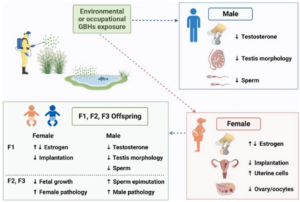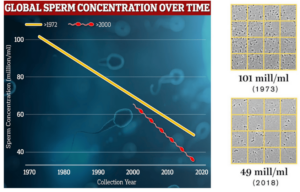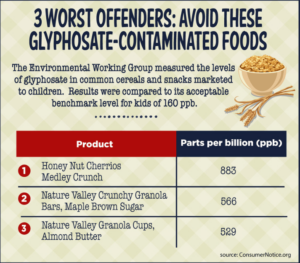You’re trying to eat clean – or at least cleaner. Maybe you skip fast food, hit the gym, and opt for “just a few” snack foods here and there. But here’s the kicker: even your childhood favorite Girl Scout cookie variety is probably sabotaging your health in ways that no label warns you about.
A recent report from GMOScience and Moms Across America tested 25 different Girl Scout cookie samples from 3 states – and found glyphosate in 100% of them. Not just trace levels either: Thin Mints contained 334 times more glyphosate than what some independent experts deem “harmful.”
Also found in those cookies? Heavy metals like lead, cadmium, and mercury – known disruptors of hormone function, fertility, and cognitive health.
This isn’t just about cookies. It’s a peek into the broken food system that men navigate every day – largely unaware of what’s in so much of what they fuel and comfort themselves with.
Dewayne Johnson: A Name You Should Know
In 2018, Dewayne “Lee” Johnson, a school groundskeeper in California, became the first person to take Monsanto (maker of Roundup) to court over glyphosate exposure – and win.
For years, he applied Roundup to school grounds without protective gear. Eventually, he developed non-Hodgkin’s lymphoma, an aggressive form of cancer. At one point, 80% of his body was covered in lesions. A jury awarded him $289 million (eventually reduced to $78 million), concluding that glyphosate contributed significantly to his illness.
That was from external, occupational exposure.
Now imagine what happens when you’re eating trace amounts of glyphosate daily, unknowingly, through conventional snacks, grains, legumes, and even protein bars.
Johnson’s case is not an isolated one. Thousands of similar lawsuits have since followed, with plaintiffs alleging that glyphosate exposure caused their cancers. The story speaks not only to occupational exposure but to the broader risk that glyphosate presents when it infiltrates our food supply.
Hormonal Sabotage: The Endocrine Fallout
Glyphosate has been shown to interfere with the endocrine system – the delicate hormone-regulating network responsible for everything from libido and mood to muscle gain and metabolism.
Animal studies have found that glyphosate exposure can alter testosterone levels, damage sperm quality, and impair fertility. A 2020 study found that rats exposed to glyphosate experienced reduced sperm quality and testicular damage. While the evidence in humans is still emerging, the hormonal disruption linked to glyphosate exposure remains a growing concern for men’s health.

If you’ve been dealing with low energy, irritability, or unexplained plateaus at the gym, it might not just be stress. It very well could be your food.
Gut Check: Glyphosate and Your Microbiome
Glyphosate doesn’t stop at hormones. It also disrupts your gut microbiome, the community of beneficial bacteria that help regulate everything from digestion and inflammation to immune response and mental clarity.
Studies have found that glyphosate targets the shikimate pathway, present in gut bacteria but not in human cells, resulting in weakened microbial diversity. Translation? Less resilience, more inflammation, and a higher chance of chronic gut and mood issues.
Since gut health is directly linked to neurotransmitter production, particularly serotonin and dopamine, a compromised microbiome can also contribute to anxiety, depression, and cognitive decline. This means glyphosate doesn’t just affect your body – it affects your mind.
Fertility Fallout: Glyphosate’s Impact on Sperm Health
Let’s talk about fertility. Studies indicate that sperm counts have declined by over 50% in the last 50 years. Researchers call it a “sperm crisis,” and glyphosate exposure could be one of the underlying factors.

A study published in Frontiers in Endocrinology found that Roundup disrupts the reproductive system by impairing sperm quality and decreasing testosterone levels. Heavy metals like lead and cadmium further compound this effect, damaging DNA integrity in sperm cells.
For guys who aspire to one day have a kid or simply maintain the option with optimal reproductive health, reducing glyphosate exposure should be a big priority.
The Processed Food Trap
We live in a world where convenience is king. But the reality is, most conventional packaged foods – especially those made with corn, soy, wheat, oats, and non-organic sugars – are so often soaked in chemicals like glyphosate before harvest.
This includes:
- Crackers
- Snack bars
- Cereals
- Protein cookies
- “Healthy” processed snacks
Even if you’re training hard and eating enough protein, you could be undoing your progress with hormone-sabotaging additives in your pantry.
Final Word: Your Biology Deserves Better
Men’s health isn’t just about lifting heavy or pushing hard. It’s about what you allow into your system – and what you support from the food industry with your dollars.
If Dewayne Johnson’s story teaches us anything, it’s that ignoring glyphosate exposure can cost you everything. And while you’re probably not spraying Roundup, you may very well still be ingesting it every single day.
But here’s the empowering part: awareness leads to action. The more you know, the more control you have over what goes into your body. Supporting local, organic farms, reading ingredient labels, and choosing whole foods over ultra-processed options are steps toward long-term resilience.
Even small changes – like replacing conventional grains with organic options or swapping out pesticide-laden snack foods – can have a big impact over time. Men often pride themselves on discipline and pushing through challenges. Why not apply that same mindset to your health?
It’s also seriously important to speak up; we can no longer ignore the reality of the toxins we’ve built our food systems with. The more consumers demand transparency and safer food, the harder it becomes for companies to cut corners and ignore the consequences of glyphosate. You have the power to influence what ends up on shelves, in restaurants, and on your plate.
You don’t have to change everything overnight. Small, consistent changes like opting for organic ingredients, choosing local produce, and supporting companies that prioritize regenerative agriculture can make a big difference.
And it’s not just for you. Every choice you make today has the potential to influence the health of future generations. Lowering your toxic burden can mean a healthier life for your children and a stronger legacy overall.
Be the guy who reads ingredients. Be the guy who speaks up. Be the guy who protects his future.
Because in the end, your health isn’t just a matter of luck – it’s also a matter of choice. And that choice starts now.








